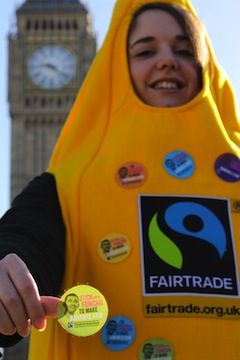| GO TO FINE CHEESE & CHARCUTERIE | ABOUT | CURRENT ISSUE | PAST ISSUES | NEWS HEADLINES | CUSTOM PUBLICATIONS | RETAIL FOODSERVICE |

Fairtrade Products Grow to $7.3 Billion WorldwidePosted on 9/8/2014

Shoppers continue to reach for Fairtrade-labeled products in ever-growing numbers while Fairtrade’s offer to farmers and workers deepens, according to a new report by Fairtrade International. The world’s leading ethical label had strong continued growth as consumer sales of Fairtrade-certified products grew to $7.3 billion worldwide in 2013. Among Fairtrade’s leading products, 2013 sales grew for coffee (8 percent), sugar (22 percent), bananas (12 percent) and flowers (16 percent). Strongest growth markets include the United States, where sales of Fairtrade products grew to $426 million since the Fairtrade mark’s introduction in 2012, and new markets India and Kenya, which join South Africa as Fairtrade producer countries with rapidly growing sales of Fairtrade products in their own markets. Germany cemented its No. 2 market position after the United Kingdom, with consumer retail sales topping $845.9 million following strong 23 percent annual growth. At the same time, Fairtrade International reported a number of far-reaching initiatives set to open more opportunities for the people at the far end of the supply chain – now more than 1.4 million farmers and workers, belonging to 1,210 producer organizations in 74 countries. “We’re matching growth in the market with new approaches to deepen impact for farmers and workers,” said Harriet Lamb, chief executive of Fairtrade International. “If a day is a long time in politics, then a year is a short time in sustainability. Yet over the past year, we introduced new living wage benchmarks, piloted community-based approaches to prevent child labor, supported local trade unions to negotiate with employers … And this is only halfway through delivering on the bold new strategy we announced last year.” Fairtrade introduced new programs to support small farmers’ organizations to strengthen their resilience. The Fairtrade Access Fund dispensed a total of $10 million in loans to 14 producer organizations, benefitting more than 60,000 farmers. Fairtrade launched three new climate change adaptation projects in Latin America and East Africa. These programs are run together with partners and complement Fairtrade’s core standards, certification and labeling activities. Fairtrade also overhauled its approach with workers. A revised Fairtrade Standard for Hired Labor includes greater autonomy for workers in decision-making, more support for freedom of association, further flexibility on Fairtrade Premium use, and clearer requirements to progress toward living wage. “Fairtrade is about empowerment and long-term development, as farmers and workers transform deeply ingrained problems step by step to build a better future for themselves, their families and communities,” said Marike de Peña, chair of the Fairtrade International board and director of a banana cooperative in the Dominican Republic. “We can and will change the rules of trade, and enable producers and workers to map out their own future.” |